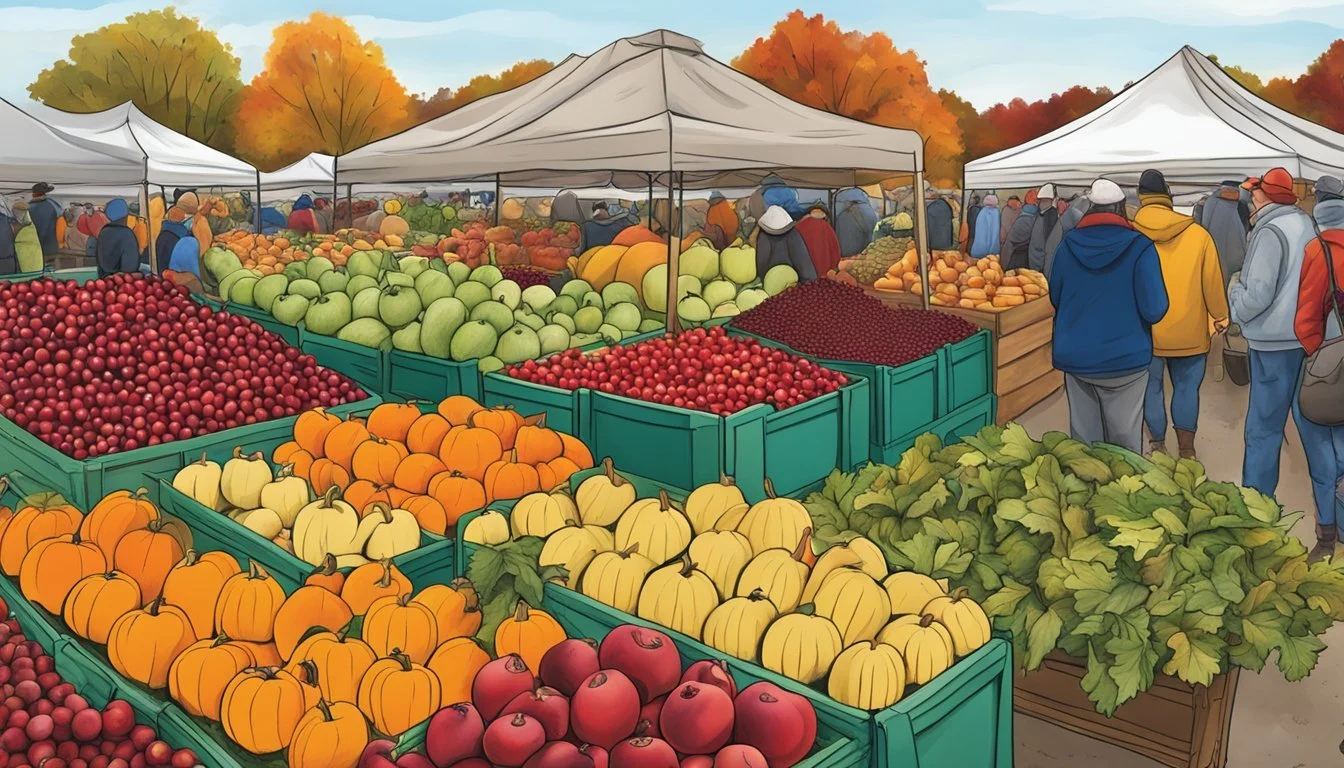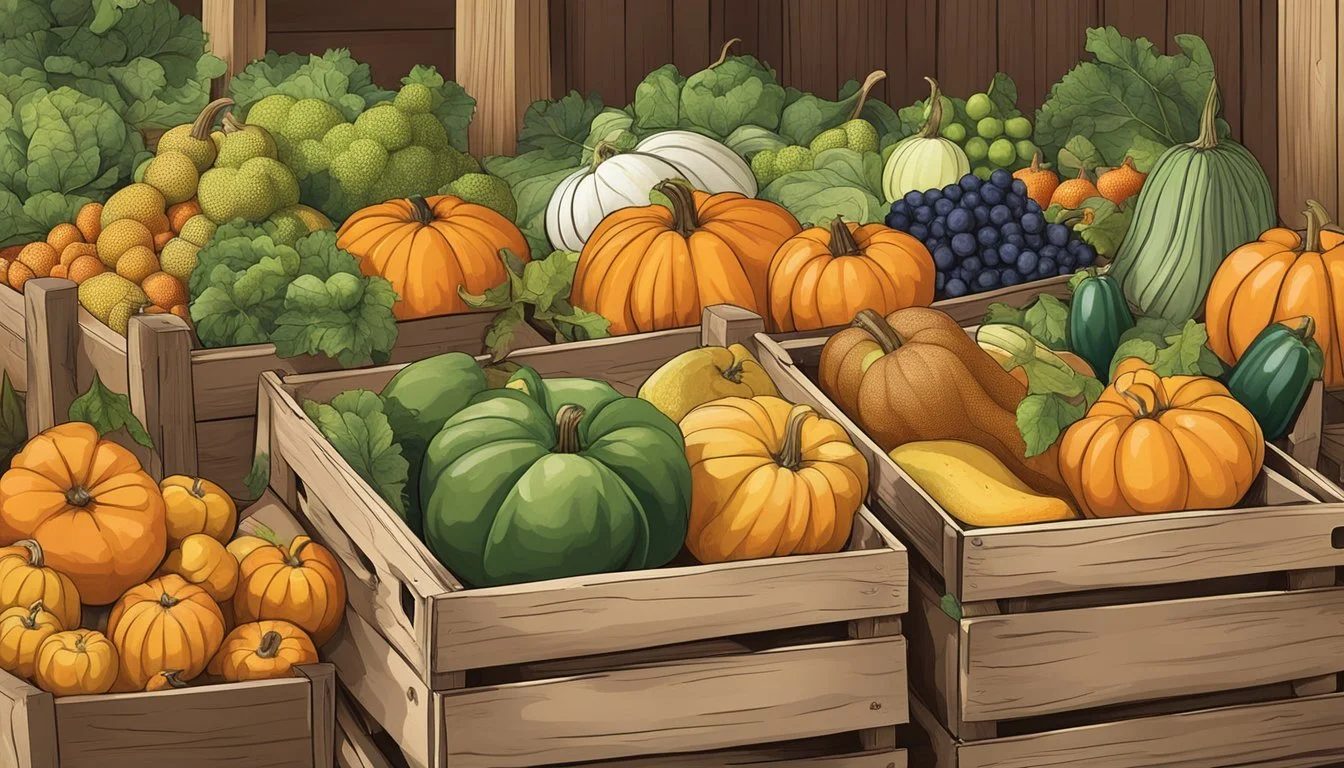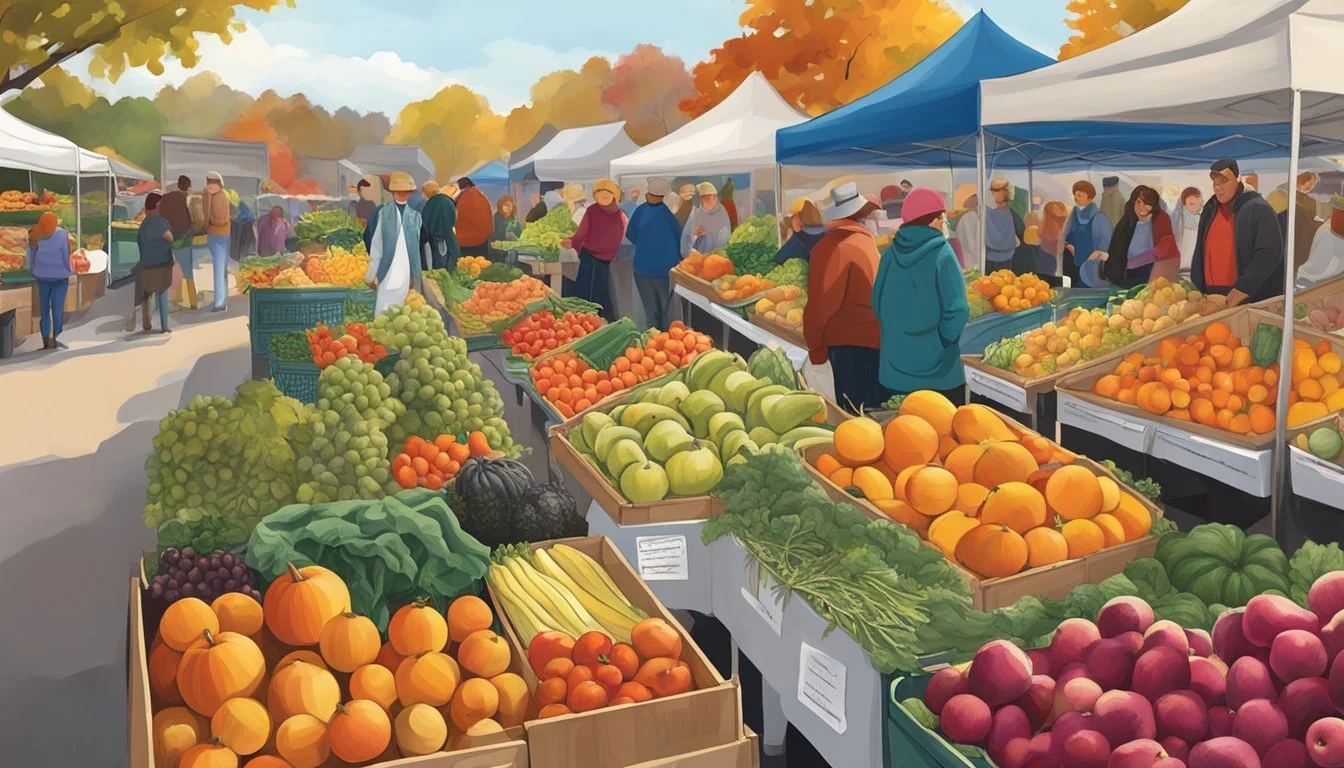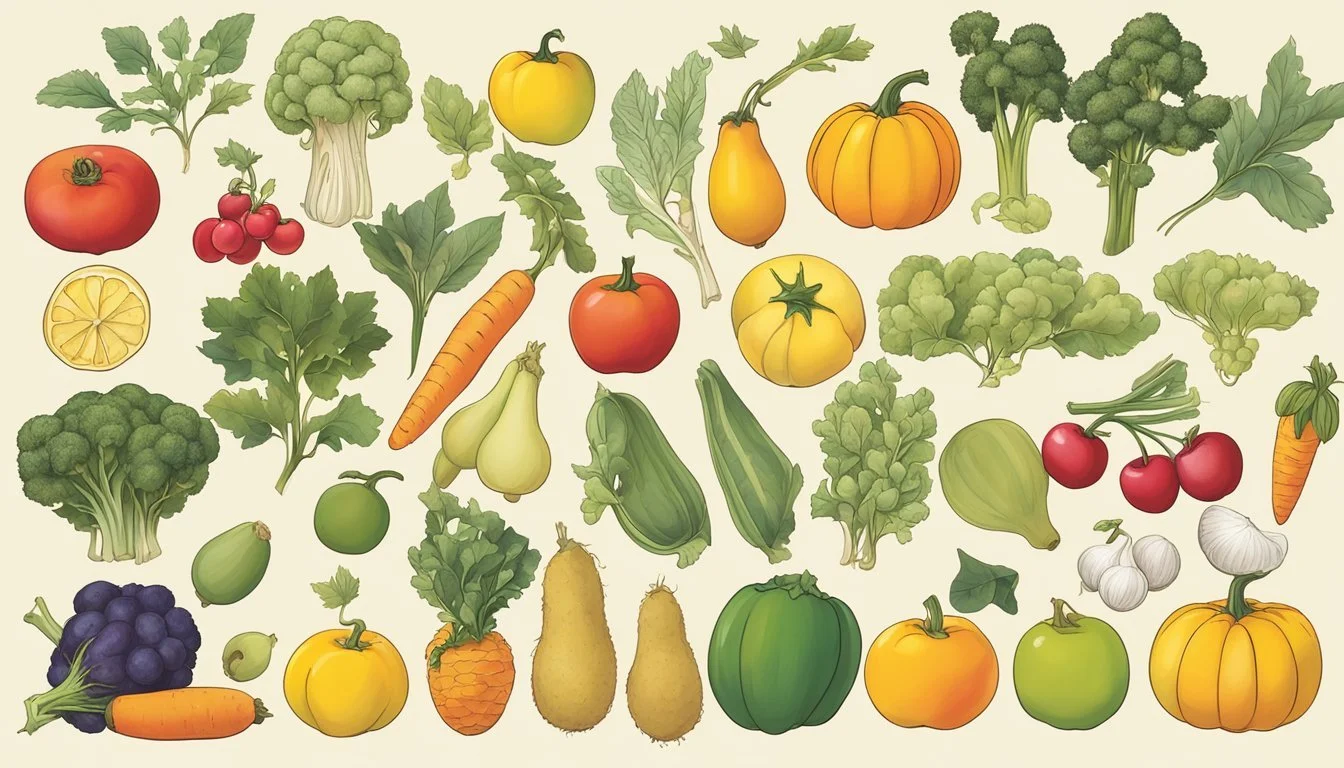Michigan Seasonal Fruit & Vegetables in November
A Guide to Local Produce
This Article is Part of our Michigan Seasonal Fruit & Veg Calendar
As November ushers in the brisk winds across the Great Lakes State, the list of seasonal fruits and vegetables available in Michigan narrows, yet remains diverse. This transitional month marks the end of the harvest season for many crops, while others reach their peak, offering a final bounty before the winter frost sets in. Root vegetables, hardy greens, and late-season fruits become the cornerstone of local produce offerings.
Michigan's cooler climate and fertile soil contribute to the ideal growing conditions for a variety of produce that can withstand the dipping temperatures. Residents and visitors alike find that even as winter approaches, farmers' markets and local grocers stock an array of fresh, locally-grown items. These include robust fruits and vegetables such as apples (how long do apples last?) and winter squash, which are not only in season but also offer the nutrients and flavors suited for hearty, comforting November dishes.
Navigating the seasonal availability ensures that consumers enjoy not only the freshest flavors but also support sustainable agricultural practices integral to Michigan's economy. While choices like summer berries and peaches disappear from the shelves, the spotlight shifts to the crisp apples and versatile root vegetables that define autumnal cuisine. The emphasis on these in-season selections underscores a commitment to regional farming and a celebration of the state's agricultural heritage.
Understanding Seasonal Eating in Michigan
Seasonal eating in Michigan emphasizes consuming produce at its peak flavor and nutritional value, typically sourced from local farms and markets.
Benefits of Seasonal Eating
Eating seasonally offers a multitude of benefits. Foods in season not only taste more flavorful, but they are often fresher, having been harvested at the correct time for peak quality. This practice supports Michigan's local agriculture and reduces the environmental impact associated with long-distance food transportation. Additionally, consumers can enjoy a diverse diet throughout the year, as the available produce changes with the seasons.
The Michigan Harvest Calendar
November in Michigan showcases a bountiful harvest, despite the cold weather setting in. Below is a table that highlights typical produce available during this month:
Fruit Vegetables Apples Broccoli Cauliflower Leeks Kale (What wine goes well with kale?) Cabbage Squash Kohlrabi
These vegetables withstand the chilly climate of late autumn and are staples for seasonal dishes. One can find these at local markets under the umbrella of Michigan Fresh, ensuring that the produce has traveled minimal distances to reach the consumer, thus retaining its freshness and nutritional content.
Seasonal Fruits in November
For those seeking the freshest tastes of Michigan in November, a variety of fruits are in peak abundance, especially apples. Local markets boast a rich assortment of produce that captures the essence of the season.
Apples and Late Harvest Fruits
Michigan's November landscapes are dotted with orchards yielding late-harvest fruits. Apples are the standout, with varieties such as the tart Granny Smith, sweet Red Delicious, and the balanced Gala available. Other late-season fruits to look for include a variety of pears, which, similar to apples, have multiple types that are at their flavorful peak during this time.
Apples: Granny Smith, Red Delicious, Gala, and more
Pears: Bartlett, Bosc, Anjou
These fruits not only represent the tail end of the harvest season but are also perfect for creating warming autumn recipes.
Availability in Markets and Stores
Grocery stores and farmers' markets across Michigan are well-stocked with November's seasonal fruits. Shoppers can find both conventional and organic options, with the fruit often prominently displayed and celebrated for its seasonal freshness.
Grocery Stores: A variety of conventional and organic apples and pears
Farmers' Markets: Locally sourced, often hand-picked fruits with a focus on sustainable agriculture
Purchasing these fruits supports local economies and offers consumers the chance to enjoy fresh, nutritious produce while it's at its best.
Seasonal Vegetables in November
In Michigan, November brings the harvest of hearty vegetables that withstand the cooler temperatures. These offerings are staples for seasonal recipes and holiday meals (What wine goes well with holiday meals?).
Root Vegetables and Squash
Squash: Varieties like butternut, acorn, and spaghetti squash are prime selections during November. These squash types are versatile for baking, roasting, or as part of warm stews.
Beets (how long do beets last?): Rich in color and nutrients, beets from Michigan are at their peak. They can be roasted whole or incorporated into salads.
Sweet Potatoes: Another hardy crop, sweet potatoes (What wine goes well with sweet potatoes?) are a nutritious addition to the November harvest. They can be a main dish, side, or used in pies.
Here is a summary of key root vegetables and squash in season:
Vegetable Availability Suggested Preparation Butternut Squash (how long does butternut squash last?) Widely available Roasted or in soups Acorn Squash Widely available Baked with a hint of cinnamon Spaghetti Squash Widely available Baked and served as a pasta substitute Beets Peak season Roasted or pickled Sweet Potatoes Peak season Mashed or used in pies
Green Vegetables and Hardy Crops
Kale: This nutrient-dense green thrives in cooler weather, becoming even sweeter after a frost.
Brussels Sprouts (how long do brussels sprouts last?): A traditional cold weather crop, they are commonly served roasted or sautéed.
These green vegetables are the stars of the late fall:
Vegetable Availability Suggested Preparation Kale In season Sautéed or in soups Brussels Sprouts In season Roasted or shaved in salads
Preparation and Preservation
As winter approaches, individuals in Michigan must consider methods to preserve the bounty of the harvest season. Proper storage and preservation techniques extend the life of produce, ensuring a supply of fruits and vegetables during the colder months.
Storing for Winter Months
Storing fresh produce during winter requires knowledge of ideal conditions for each type of fruit and vegetable. Root vegetables like potatoes and pumpkins can be stored in a cool, dark place, typically between 50-60°F. They should be kept in a well-ventilated area to prevent moisture accumulation, which can lead to spoilage.
Canning, Freezing, and Drying
Canning: Preserving fruits and vegetables through canning is an excellent way to enjoy the flavors year-round. For instance, making a sauce from end-of-harvest tomatoes extends their usefulness and provides a taste of autumn during the winter.
Freezing: Freezing is another effective preservation method, especially for fruits like raspberries. They should be washed, dried, and spread on a baking sheet to freeze individually before being transferred to airtight containers.
Drying: Drying fruits such as apples can be an alternative to freezing and canning. Sliced apples can be oven-dried or dehydrated and stored in an airtight container; they are perfect for snacks or rehydrated in dishes.
Exploring Michigan's Farmers Markets
Michigan's farmers markets are vibrant community hubs where locals can connect with producers and find an array of fresh, seasonal produce even in November.
Finding Local Produce
At Michigan farmers markets, one can find a variety of produce that is fresh and in season during the month of November. Local farmers often offer winter squash, apples, and root vegetables, which are typically harvested in the fall and available through the winter. These markets function as gateways to the freshest local produce, providing an opportunity to support regional agriculture and enjoy nutrient-rich foods.
Winter Squash: Acorn, butternut, spaghetti
Apples: Various Michigan varieties
Root Vegetables: Beets, carrots, parsnips
Farmers Market Guide
In November, visiting a farmers market requires a bit of planning. While some markets may move indoors or adjust their hours for the colder season, they continue to offer a selection of goods. Here are a few notable markets and their operating times during this period:
Fulton Street Farmers Market - Grand Rapids: Open for visitors in search of seasonal goods.
Muskegon Farmers Market: Although operating predominantly in the warmer months from May through October, one can check for special winter market dates.
Shoppers should confirm the specific dates and times before visiting, as they can vary. Further, it is advisable to contact the market directly or visit their website for the most accurate information.
Pairing Seasonal Produce With Local Foods
In the month of November, Michigan offers a tapestry of seasonal produce that pairs exceptionally well with local dairy, meats, and artisanal foods. Crafting meals with these combinations not only supports local agriculture but also provides fresh, nutrient-rich dining experiences.
Michigan Dairy and Meat Products
Michigan's November produce can be beautifully complemented by the state's rich dairy and meat offerings. Hearty greens and seasonal root vegetables serve as perfect sides to local beef and pork, which can be elevated with a sprinkling of Michigan cheeses. Eggs from local farms can enrich a vegetable hash or casserole.
Cheese: Gouda, Cheddar, or Swiss from local creameries
Meat: Free-range turkey or pasture-raised beef
Bacon: Thick-cut, applewood-smoked bacon from local pigs
Eggs: Farm fresh, incorporated into frittatas or omelets with veggies
Combining these products with November vegetables like Brussels sprouts or potatoes yields a meal that is both comforting and reflective of Michigan's culinary landscape.
Baked Goods and Artisanal Offerings
Local breads and baked goods provide a delightful base or accompaniment to Michigan's harvest. Imagine crusty bread from a local bakery, perfect for sopping up the flavorful juices of a roasted vegetable medley.
Artisanal Breads: Sourdough or multi-grain loaves
Baked Goods: Pies or tarts using late-harvest fruits like apples
Pumpkin or apple pies, baked with locally sourced ingredients, celebrate the season's flavors and serve as a testament to Michigan's bountiful autumnal offerings. By combining the crispness of just-picked apples with the rich textures of freshly baked pie crusts, one can truly embrace the essence of November in Michigan.
Seasonal Recipes and Eating Ideas
The abundance of seasonal produce in Michigan during November offers a chance to create flavorful recipes and make the most of the harvest. From simple yet robust dishes to festive holiday fare, one can explore a variety of eating experiences.
Simple Dishes and Flavor Combinations
Simplicity often leads to the best flavors, especially when using fresh, seasonal ingredients. Here are some straightforward ideas:
Roasted Acorn Squash: Cut acorn squash into wedges, drizzle with olive oil and honey, then roast until tender.
Brussels Sprouts and Cranberries: Sauté Brussels sprouts with a handful of cranberries for a perfect blend of sweet and savory.
Parsnip Puree: Steam parsnips until soft, blend with butter and a pinch of salt for a smooth, winter-worthy side dish.
Holiday-Inspired Michigan Eats
Michigan's November produce brings warmth to holiday tables:
Persimmon Pudding: A sweet and dense dessert made from fresh persimmons, complemented by a scoop of cinnamon whipped cream.
Kale and Pomegranate Salad: A vibrant salad tossing together chopped kale, pomegranate arils, pecans, and a vinaigrette for a fresh holiday starter.
Cranberry-Pear Sauce: A twist on traditional cranberry sauce, adding diced pears for extra sweetness and texture.
Educational Resources and Community Involvement
Michigan's commitment to education on seasonal produce is evident through a variety of programs that provide data and foster community engagement. They aim to enlighten residents about the benefits of Michigan produce and how to incorporate it into their diets.
Agricultural Programs and Data
Michigan's agricultural initiatives provide comprehensive data on seasonal fruits and vegetables. These efforts are supported through various educational tools designed for educators and the public to promote understanding of seasonal eating patterns. For instance, resources like the Michigan Harvest Calendar offer month-by-month guidance on what produce is currently available, specifically in November, data shows available produce includes apples, brussels sprouts, and winter squash.
Connecting Through Social Media
The Michigan community connects through social media platforms, such as Facebook, to share knowledge and experiences with local produce. This includes posting seasonal recipes, availability updates, and tips for storing and preparing Michigan fruits and vegetables. Community groups on social media serve as hubs for individuals to support local farmers' markets and share data on where and when to find the freshest local produce.









